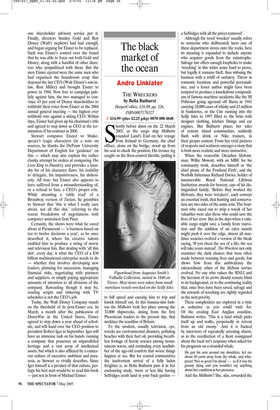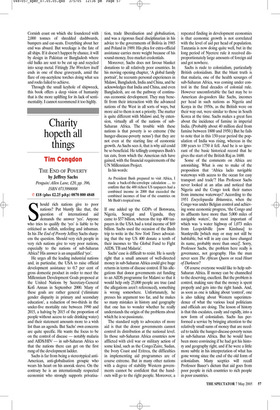The black market of the ocean
Andro Linklater
THE WRECKERS by Bella Bathurst HarperCollins, £16.99, pp. 326, ISBN0007170327 ✆ £14.99 (plus £2.25 p&p) 0870 800 4848 Shortly before dawn on the 22 March 2003, as the cargo ship Mülheim rounded Land’s End on her voyage from Ireland to Germany, the chief officer, alone on the bridge, stood up from his seat to check the position. His trouser leg caught on the floor-control throttle, pulling it to full speed and causing him to trip and knock himself out. In this banana-skin fashion the Mülheim took her place among the 33,000 shipwrecks, dating from the first Phoenician traders to the present day, that necklace the coastline of Britain.
To the modern, usually television, eye, wrecks are environmental disasters, polluting beaches with their fuel oil, providing breathless footage of heroic rescues among mountainous waves, and reminding every landlubber of the age-old comfort that worse things happen at sea. But for coastal communities the inadvertent arrival of a fully laden freighter is, as Bella Bathurst puts it in her enchanting study, ‘more or less like having Selfridges crash land in your back garden — a Selfridges with all the prices removed’.
Although the word ‘wrecker’ usually refers to someone who deliberately lures one of these department stores onto the rocks, here its meaning is expanded to include anyone who acquires goods from the catastrophe. Salvage law offers enough loopholes to make ‘wrecking’ in this wider sense hard to prove, but legally it remains theft, thus imbuing the business with a whiff of outlawry. Throw in romantic locations and powerful personalities, and a lesser author might have been tempted to produce a knockabout compendium of famous maritime accidents, like the SS Politician going aground off Barra in 1941 carrying 28,000 cases of whisky and £3 million in banknotes, or the Cita running into the Scilly Isles in 1997 filled to the brim with designer clothing, kitchen fittings and car engines. But Bathurst places her tales of remote island communities, suddenly flush with drink or Nike trainers, in their proper context. From her vivid pictures of seaports and seafarers emerges a story that is both more realistic and more instructive.
When the venerable Orcadian lifeboatman, Willie Mowatt, with an MBE for his community work, describes himself as ‘the chief pirate of the Pentland Firth’, and the Norfolk fisherman Richard Davies, holder of innumerable Royal National Lifeboat Institution awards for bravery, says of his distinguished family, ‘Before they worked the lifeboats, they were wreckers’, each conveys an essential truth, that hunting and conservation are two sides of the same coin. The boatmen who raced out to strip a wreck of her valuables were also those who could save the lives of her crew. But in the days when a valuable cargo might save a family from starvation and the addition of an extra mouth might push it over the edge, almost all maritime societies evolved a version of the bleak saying, ‘If you cheat the sea of a life, the sea will take yours instead’. The Wreckers not only examines the dark choices that were often made between rescuing lives and goods, but shows how from this ambivalence the extraordinary ethos of the lifeboat service evolved. No one who values the RNLI and the heroism of its crews should remain blind to its background, or to the continuing reality that, once lives have been saved, salvage and the rewards of wrecking are rightly regarded as the next priority.
These complexities are explored in a style as seductive as you could wish for. Of the eroding East Anglian coastline, Bathurst writes, ‘This is a land which picks itself up and walks, perpetually in retreat from an old enemy.’ And it is backed by interviews of repeatedly arresting charm, as in the recollection of a Kent coastguard about the local vet’s response when asked for his prognosis on a stranded whale.
He put his arm around my shoulders, led me about 40 yards away from the whale, and whispered ‘Not so good I’m afraid’ — as if it was his granny dying and you wouldn’t say anything about her condition in her presence.
And the Mülheim? She, alas, rewarded the Cornish coast on which she foundered with 2,000 tonnes of shredded dashboards, bumpers and car-seats. Everything about her end was absurd. But wreckage is the fate of all ships. If it doesn’t happen by chance, it will by design in Pakistan or Bangladesh where old hulks are sent to be cut up and recycled into scrap metal. Fittingly The Wreckers itself ends in one of these graveyards, amid the flare of oxy-acetylene torches doing what sea and rocks failed to achieve.
Through the small keyhole of shipwreck, this book offers a deep vision of humanity that is the more uplifting for its lack of sentimentality. I cannot recommend it too highly.




























































 Previous page
Previous page